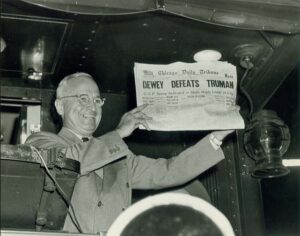Poll averaging services reduce the margin of error
RealClear Politics — Conservative curator of polls
Five Thirty Eight – Liberal curator of polls
270 to Win – Middle of the road polls
Covering elections and polls
Advice for journalists
- The “horse race” is the most visible but surely not be the most important thing to be reported. The process itself is less important than the issues.
- Campaign issues are defined by the public as well as the candidates. Be sure you are in touch with many voters and ask open-ended questions about what they think the issues are.
- Create tables or Q & As for comparisons between the various candidate positions on the issues.
- Fact check candidate answers
- Understand how polls work. Don’t mistake a “push” poll for a legitimate random sample poll (See AAPOR code, below)
- On campus: Interviews for journalism classes do NOT have to be cleared by the Institutional Review Board if they are about political opinions and not personal issues. (IRBs are good, but not for plain vanilla person-on-the-street journalism interviews).
- Dont report results prematurely. Wait for all ballots to be counted.
Reporting public opinion polls.
Brief overview and history of public opinion polling (Wikipedia)
What should public opinion researchers tell the public about the way they conducted their poll? The AAPOR code of ethics provides a list.
Here’s an example of a poll with loaded questions that violates the AAPOR code of ethics in a variety of ways. Donald Trump’s Mainstream Media Accountability Survey.
Here’s an example of an ethical Washington Post poll report that shows demographics and questions.
How the journalists got the horse race wrong – and what’s important in an election. Michael Gerson / Washington Post.
Election reporting resources
International Journalists Network article Ten Tips for reporting elections.
How the Associated Press calls election results.
The Virginia Public Access Project provides a compilation of stories on state politics.
Virginia Dept. of Elections — Database of voting statistics since 2005. See how your city or county voted in the past and if or how those patterns may be changing.
Reporters without borders – International handbook on election reporting
Journalists Resource – Political polling research roundup
Reporting at the polls
Reporters Committee for Freedom of the press legal resources
Virginia General Registrar of Elections Board (GREB) Handbook
The officers of election shall permit representatives of the news media to visit and film or photograph inside the polling place for a reasonable and limited period of time while the polls are open. However, the media (i) shall comply with the restrictions in subsections A and D; (ii) shall not film or photograph any person who specifically asks the media representative at that time that he not be filmed or photographed; (iii) shall not film or photograph the voter or the ballot in such a way that divulges how any individual voter is voting; and (iv) shall not film or photograph the voter list or any other voter record or material at the precinct in such a way that it divulges the name or other information concerning any individual voter.
Any interviews with voters, candidates or other persons, live broadcasts, or taping of reporters’ remarks, shall be conducted outside of the polling place and the prohibited area. The officers of election may require any person who is found by a majority of the officers present to be in violation of this subsection to leave the polling place and the prohibited area.
“Guarding” the polls — Why is Donald Trump Jr.’s call for an “army” of citizens to “guard” the polls a problem? Who does guard the polls? What if the Democrats call out their own “army” to “guard” the polls? Story idea: Who are the Republican and Democratic poll watchers? How does an election actually work? What are the checks and balances? (Your voter registrar is more than happy to answer these sorts of questions in the run-up to an election).
Following up
How well do politicians follow through on their campaign promises? In Virginia, you might want to follow bills introduced by the successful candidates on the General Assembly home page.
Older resources
Political polling — an excellent overview of basic statistics and how it applies to the 2016 race.

